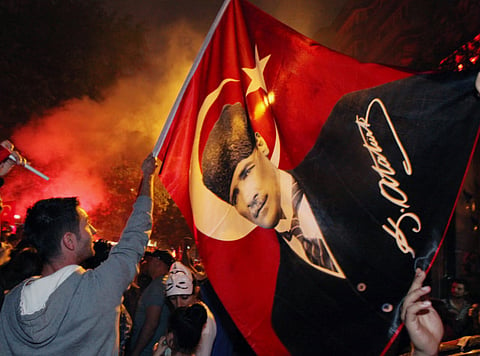Turkey protests unnerve Arab Islamists, analysts say
Secular opposition in the region remains weak despite discontent with ruling Islamic parties

Cairo: The pro-secular protests rocking Turkish cities have sent ripples across the Arab world, unnerving Islamist leaders who have long touted Turkey as a successful model of political Islam, analysts say.
Thousands of Turks have joined in mass anti-government demonstrations, defying Prime Minister Recep Tayyip Erdogan’s call to end the worst civil unrest of his decade-long rule.
Turkey’s unrest began when police cracked down heavily on a small campaign to save an Istanbul park from demolition, spiralling into nationwide protests against Erdogan and his Islamist-based Justice and Development Party (AKP), seen as increasingly authoritarian. Across the Mediterranean, Arab Spring countries are keeping a close eye on events.
Islamist-led Egypt and Tunisia “must be worried about the problems faced by Erdogan’s Turkey, a supposedly successful model” of political Islam, said Antoine Basbous director of the Paris-based Observatory of Arab countries. Tunisia and Egypt - where unprecedented revolts led to the ouster of longtime dictators in 2011 and propelled Islamists to the forefront of politics- have repeatedly pointed to Turkey as a good example of a moderate Islamist democracy.
The Islamist party Ennahda which won post-revolution polls in Tunisia has openly expressed its admiration for the “Turkish model,” while Egyptian President Mohammad Mursi who addressed the AKP’s congress in September 2012 lauded Erdogan’s party as a “source of inspiration”.
But both Arab states have been suffering increasing polarisation between Islamists and secularists, with Islamists in power accused of failing to live up to their promise of guaranteeing rights and freedoms.
In Egypt, many are drawing parallels between the anti-AKP protests and the mass rallies scheduled for June 30 against President Mursi on the first anniversary of his assumption of power.
But members of Mursi’s Freedom and Justice Party say such parallels are only aimed at pulling the rug from under the Islamist regimes.
“What is going on in Turkey has nothing to do with daily or economic needs. It is intended to promote the idea that Islamic regimes, which have made economic achievements and proved to the world that they can stand in the face of all external challenges, have failed,” Murad Ali, the FJP’s media adviser, said in a newspaper interview.
But Basbous argues that the Turkey protests are serving to remind liberals and secularists in the Arab world “that they were the motor of change” during the 2011 uprisings.
However, that will not necessarily translate into change on the ground because the secular opposition in the Arab Spring countries remains weak and poorly organised, he said.
In Tunisia, political analyst Sami Brahem said: “There are attempts to export what’s happening in Turkey to Tunisia. It may not inspire a major protest movement, but [the situation in Turkey] can be a moral support to secularists.”
Some see the protests in Turkey as part of a region-wide discontent with political Islam, despite the stark differences in context - Erdogan was elected three times, with a steady increase of votes each time.
“At the end of the day, what matters is not the soundness of the analogy, but public perceptions of it and its ability to capture the imagination, which it seems to be doing right now,” said Hesham Salam, Washington-based political analyst at Georgetown University.



